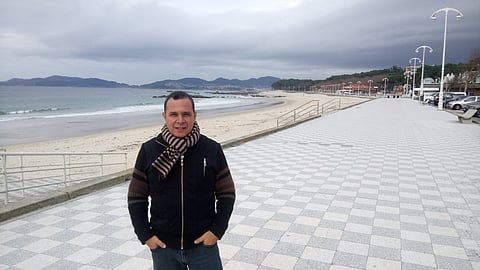

These TalentView have given us some insight into the different personalities, challenges, stories, and solutions everyone has. And I believe that is one of the richest elements of humanity. Today I want to share with you Daniel Arana's Aquaculture story. Daniel is a 47 years old marine biologist, native of Venezuela. He has been in the industry for over 20 years with roles in different countries. And is currently Aquaculture Global Product Manager for Huvepharma, in Belgium.
Some of these stories start this part of the interview with "I was basically a fish", others came into the industry by serendipity. For Daniel, his story is as unique as all of the ones I have shared in the past. He was born and raised in Apure. A state which is very far from the sea. However, for every holiday and summer vacation, his family would get in a car and travel to the nearest coastal town. Only 13 hours away.
"I remember this ad on TV that said 'everybody wants to be a Marine Biologist'. And that was my case. I also met a Marine Biologist, growing up. He was doing some studies on crabs. So I kind of felt like what I wanted to do had to be marine-related". Being from Apure, deep inside Venezuelan plains. He had to apply for a university that was on an island. Far from home.
"My family was very supportive of my dream. They let me go to Margarita, so I could study at Universidad de Oriente. Even though I was studying Marine Biology, I had made a lot of friends. All of them were in the Bachelor for Aquaculture. So, for all my extracurriculars and electives I would take them from Aquaculture. Which was the same building, just a different degree. I ended up as a Marine Biology grad with strong ties to Aquaculture".
At the beginning of his career, Daniel Arana had the opportunity to join the Interamerican Tropical Tuna Commission. A commission that takes care of the preservation of aquatic mammals. In the case of his operations, big marine animals such as sharks, whales and dolphins, and any other animal that could be at risk from Tuna fishing practices. "My job was to gather and keep statistics of tuna fishing vessels fishing in the eastern Pacific Ocean. Life at sea was not easy. I would spend 3 months onboard and two weeks at home".
"I have always been interested in caring for the environment. Any environment. And of course, as a Marine Biologist, it is one of my passions. Aquaculture makes sense to me environmentally, it is more sustainable than fishing. However, when we talk about bycatch and incidental catch, which was what I was tracking in that first job. The annual quota -this was 23 years ago- for the ships I was on board, was 20 incidental catches. Nevertheless, in most cases, they wouldn't even reach 5 or 6 per year. Fishing practices were very strict back then. They knew if they overexploited, they would run out of product. And nobody wants that".
So, Daniel's first job was more related to his Marine Biology degree than Aquaculture. But after two years of working non-stop onboard tuna fishing vessels, he had the opportunity to join the aquaculture industry. "My first job was very demanding, socially especially. I was then offered the opportunity to join a company in Falcon state. They were one of the biggest Shrimp farms in the country at the moment. I was Production Manager Assistant and then became Production manager. It was the golden hour of Venezuelan shrimp".
Aquaculture made sense to Daniel Arana. He says as a Marine Biologist he just can not unlink himself from the environmental needs. But also, as a human, he can't unlink from the need for protein consumption, hence protein production. "We have a growing population and we need to put at practice a lot of knowledge and science to have sustainable production. To me Aquaculture, of course, is more than producing fish for consumption, there is a lot more behind that. Aquaculture is more than what Aquaculturists do. The industry has so many disciplines, needs, and uses. That it has become essential for human development".
"The industry has faced and faces many challenges. But the biggest challenge I have faced personally is educating the world about this. You can go to any seafood restaurant, and 80% of the time people won't know that the fish they are eating comes from aquaculture. People don't know a lot about aquaculture. And the lack of knowledge is the seed for taboos. People think the industry is full of antibiotics and whatnot. But are unaware of all the permits and certifications a company needs to produce something".
"Unity from the industry is necessary, but it is so difficult. The needs and problems salmon production faces are not the same as Shrimp or Tilapia. Not one product is the same. Producing all the different 500 species is not the same as just producing poultry. Their needs, feeds, strategies, benefits, challenges, times, everything is different across species. That is what makes this unity more difficult. Not because they are not interested in being united, but because they are all standing from different points in the industry. But everyone has the same objective. Which is producing an aquatic animal with the highest results and performance without affecting the environment".
So, Daniel, if you HAD to go to another industry and could only take ONE thing from the Aquaculture Industry, what would you take?
"This is a difficult question because I don't see myself working in something that is not somehow related to aquaculture. But something useful in any place is the ability to deal with people. Having worked in many countries with such different cultures and clients, you always have to find new ways to approach them".
